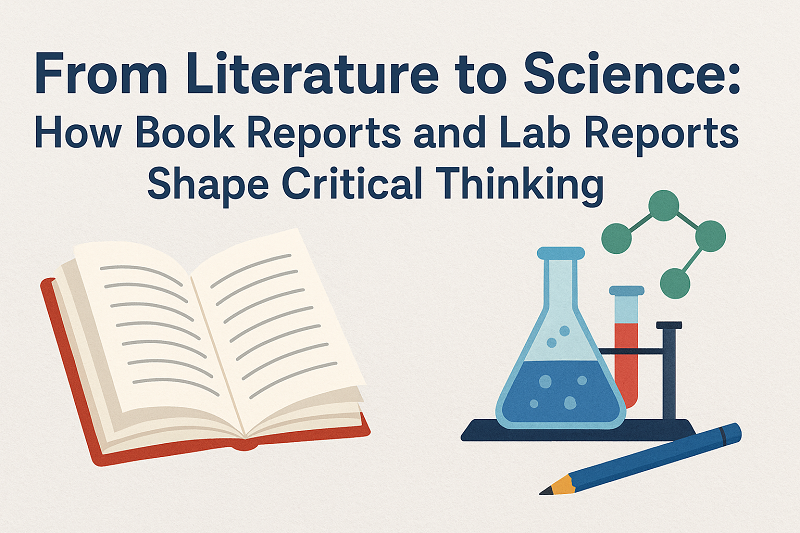The terms “critical thinking,” “analytical reasoning,” “imagination,” and “systematic analysis” have significance in education. Some say it is an overused term, but the role played by it is prominent in everyday writing projects. When we talk about book reports and lab reports, they appear to be entirely different. Book reports with fiction or non-fiction involve their proper interpretation and their themes and characters analysis. In contrast, lab reports focus on systematic experimentation, data recording, and analysis. However, both projects involve the interpretation of information, but in a way that thoughts are properly organized and conclusions are clearly presented. The debate “book report vs lab report” is intellectual, and this blog helps you learn how book reports and lab reports shape critical thinking. Keep reading!
Book Report vs Lab Report: Exploring Their Cognitive Roles
There are distinct academic purposes served by Book Reports and Lab Reports.
1. Nature of Each Assignment
Book Reports:
- Involve plot, character motivations, and thematic elements that need to be deeply analyzed.
- Involve symbolic implications and subtle narrative strategies that need to be interpreted.
- Require learners to thoroughly read to critically analyze each line and perspective.
Lab Reports:
- Focus on data collection and methodical procedures that must be done precisely.
- Require students to clearly analyze empirical results and make evidence-based summaries.
- Require writers to ensure clarity, precision, and adherence to the right scientific methods.
2. Cognitive Skills Developed
Book Reports:
- Require students to ensure abstract reasoning and creative thinking.
- Require students to engage with ambiguity and interpretive challenges.
Lab Reports:
- Focus on enhancing logical reasoning and analysis with a systematic approach.
- Emphasize disciplined, objective problem-solving.
3. Shared Educational Purpose
- Although approaches are different, the underlying aim of both assignments is to strengthen the reasoning abilities of students.
- Creativity and flexibility are two main elements that literature fosters, while structure and rigor are built by scientific reporting.
- Overall intellectual growth is strongly supported by proficiency in both areas, which assists learners in keeping divergent and convergent thinking balanced.
When crafting book reports and lab reports, the competence of students is developed. They become able to navigate and shine in wide-ranging cognitive landscapes. This way, students can foster an adaptable and balanced intellect, which is essential to ensure success in both the academic and real worlds.
The Power of Literary Analysis
Some students believe that they need to simply retell the story in book reports. Remember that writing book reports requires you to use your brain, focus on hints, find implications, and integrate your own perspectives. You need to critically analyze the plot and support your thoughts with stuff absolutely according to the book’s text. In fact, consider it as mental weightlifting, meaning that you have to get your thinking style strong. Instead of just finding the role of characters, focus on the question ‘why’: why they’re even making those unusual decisions. You have to build your analytical skills, enabling you to go beyond what the plot reveals. It also builds empathy that allows one to start understanding what their warped perspectives are.
If you have a book report assignment tackling complex or traditional books, you don’t need to worry about that. Teachers always require students to plan what their moves are, organize arguments, and go through again and again until they reach the absolute one. When you write a book report, you actually give your brain a tune-up. You complete the report with perfect logical thinking, more imagination, and understanding people better, all within the book’s main purpose. All these suggest that mastering how to write a book report is essential to succeed.
Lab Reports: Precision and Analytical Thinking
The term “detail” is strongly attached to lab reports, meaning that you have to write every phase, number, and complication deeply. Don’t think that this practice is only confined to science classes. Team projects and supervisors also appreciate good record-keeping, a practice that can only be developed when you are well aware of how to write a lab report. It means if you miss even a single step or fail to focus on details, you may be stuck understanding results later. Each stage of the process needs to be reviewed and followed, and you can ensure this by writing clear and reasonable notes.
When experiments fail or do not work according to the plan you designed earlier, you can benefit from the lab report to ascertain the reasons and make adjustments, building problem-solving skills and teaching persistence. You build logical reasoning skills by learning how to analyze results and think with a critical mind, which is valuable even for professional work, teamwork, and even in day-to-day matters where organization and clarity are of great importance.
Creativity Meets Structure
How these technical writing projects complement each other is what the true worth of a book report vs a lab report lies in. Students improve their interpretive and abstract thinking skills with literary reports, and reinforce analytical and systematic reasoning expertise with lab reports. Engaging with both assignments helps students learn to move between diverse cognitive or thinking patterns, including creative exploration and evidence-based analysis.
When it comes to real-world problem-solving, this balance is extremely helpful. In any real-world problem scenario, you need solutions that often require both imagination and methodical accuracy. Literary narratives can help a student draw inspiration to construct hypotheses, or they can approach lab results creatively. And the perfect blend of both produces valuable insights that further reinforce overall reasoning skills.
Developing Strong Writing Skills
One of the positive aspects is your writing abilities, which you can refine through both types of reports. When you master how to write a book report, you are taught how to argue in a persuasive manner and integrate evidence smoothly. On the other hand, mastering how to write a lab report helps you learn how to take a clear and logical approach to presenting technical information. Whether you have a book report or a lab report assignment, they require practice, revision, and feedback.
Students often need additional guidance, and they may turn to prefer a professional book report writing service or an expert book report writer. They access these resources for getting structured examples of high-quality written model papers, helping them understand how to make and present their arguments and express their thoughts clearly.
Similarly, students also need expert guidance, and a custom lab report writing service gives them a solution. Students can review their useful reference papers to see the way of presenting information with accuracy and detail.
Remember that approaching online help resources or experts doesn’t mean you are replacing your own independent effort, learning and mind.
Feedback: Enhancing Critical Thinking
Structured feedback is essential to multiply the benefits of both book reports and lab reports. With the peer reviewing approach and by focusing on the comments provided by the instructor, you can highlight mistakes and areas for improvement. Feedback, in literary reports and lab reports, can refine interpretive reasoning and sharpen analytical accuracy, respectively.
Students can reduce stress by understanding that writing is iterative. To internalize critical thinking processes, it is good to pay attention to drafting, positively receive feedback, and revise the work according to the feedback. When students engage in this cycle, they actually strengthen their learning in how to write a book report and/or a lab report, helping them boost confidence levels.
Wrapping Up
The comparison “book report vs lab report” is an intellectual debate that demonstrates how these two academic writing projects help students build complementary cognitive skills. When a student engages with both modes of technical writing, they have the opportunity to develop a balanced intellectual resource set, helping them approach abstract ideas and real-world problems boldly. These assignments demand a student to have the right strategic guidance, follow the step-by-step practice, and gladly receive feedback. Following these tips can help you make your report assignments a professional training ground to develop essential skills, including analytical reasoning, imagination, and systematic analysis.





